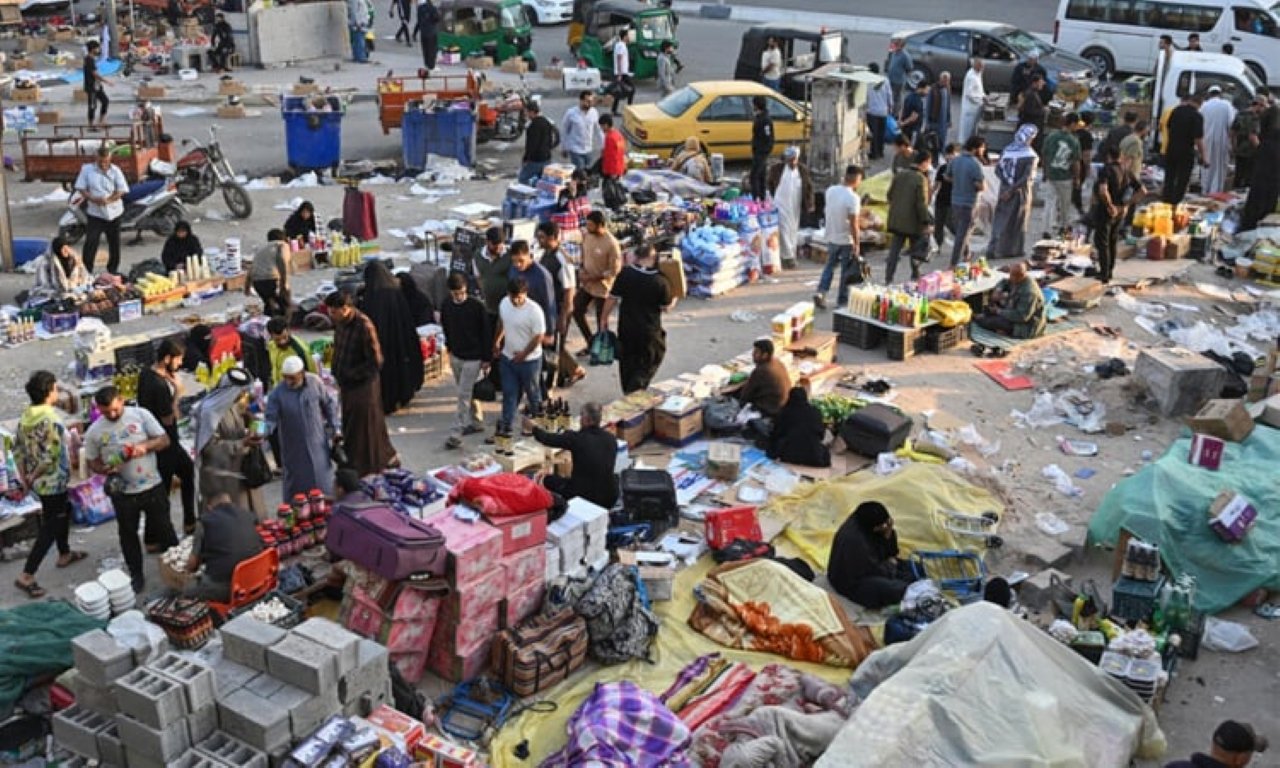BASRA, Iraq, 12 April 2025 – As economic sanctions and inflation devastate livelihoods in Iran, struggling vendors increasingly cross into Iraq’s southern city of Basra in search of stability and survival.
Every Friday, Alawi, a 36-year-old Iranian vendor, makes the taxing journey from Iran into Iraq through the Chalamja border crossing. Laden with bags of okra or dates—depending on the season—he heads to the bustling markets of Basra. There, amidst the clamour of weekend shoppers, he finds a source of hope denied to him in his homeland.
Alawi, like many of his compatriots, has turned to Iraq’s markets to earn a modest but stable living. “The situation is difficult due to the embargo,” he explains, referencing Western sanctions that continue to cripple Iran’s economy. While once he tried selling his produce in Iran, the lack of customers and spoiling goods left him with heavy losses. In contrast, in Basra, he earns between $30 and $50 a day—income that is both reliable and valuable when converted into Iranian rials.
“When we exchange Iraqi money for Iranian rials, it’s a lot,” Alawi says. “We can live on it for five days or even a week.”
Sanctions and Soaring Inflation: A Shrinking Economy
Iran’s economy has been in steady decline since 2018 when the United States, under then-President Donald Trump, withdrew from the nuclear accord and reimposed sanctions. The Iranian rial has plummeted in value, pushing inflation and unemployment to record levels.
| Economic Indicators – Iran | 2023 | 2024 | 2025 (March) |
|---|---|---|---|
| Inflation Rate (YoY) | 43.4% | 37.8% | 32.1% |
| Unemployment Rate | 10.6% | 11.2% | 12.0% (est.) |
| Exchange Rate (USD/IRR) | 270,000 | 310,000 | 350,000+ |
Source: Iran Central Bank & Independent Economic Monitors
The socio-economic crisis has turned border towns like Basra into economic lifelines for desperate Iranian traders, many of whom are working-class men, women, and even elderly individuals.
Basra: A Cross-Border Lifeline
Basra’s proximity to Iran’s Khuzestan province—home to many ethnic Arabs who share cultural and linguistic ties with Iraq—makes the region especially attractive to Iranian vendors. On Fridays, its open markets swell with shoppers and traders alike.
“This informal cross-border trade has grown significantly over the past decade,” says Hayder al-Shakeri, a researcher at Chatham House. “It’s a vital lifeline for many Iranians.”
The benefits are mutual. Iraqi consumers enjoy cheaper goods, including household items and traditional foods like geymar—a thick cream enjoyed at breakfast with honey. One Iraqi shopper noted, “Their geymar is better than ours and cheaper—12,000 dinars compared to 16,000.”
Struggles and Sacrifices of Iran’s Pedlars
Milad, a 17-year-old with curly hair, works alongside his mother in a small rented shop in Basra, selling kitchen essentials. “Finding work in Iran is hard, and the currency is weak,” he says. Despite his young age, he shoulders the economic burden of his family.
Another vendor, Umm Mansur, a 47-year-old mother of five, has faced mistreatment at the border. “They insult and mistreat us,” she recounts. “But I still come. I can earn four times what I would back home.”
Such stories are common. Many pedlars report being detained for hours, yet they persevere, driven by necessity and a lack of options in their home country.
Rising Tensions with Local Vendors
While many Iraqis benefit from the influx of affordable goods, not all are pleased. Local Iraqi traders often resent the competition. Security forces occasionally remove Iranian vendors from the markets—only for them to return the next week.
Despite these challenges, the movement continues, powered by the desperation of Iran’s economic collapse and the opportunity that even modest earnings in Iraq represent.
As geopolitical negotiations are set to resume in Oman regarding Iran’s nuclear programme, the fate of these traders hangs in the balance. Until then, Basra remains a fragile but vital economic refuge.
